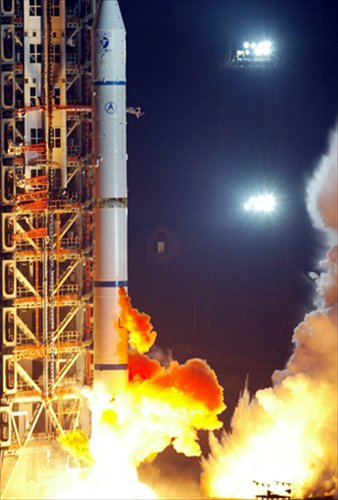HOME >> CHINA
Experts say Sino-US space collaboration is likely to stay sci-fi
By Kou Jie Source:Global Times Published: 2016-5-26 21:38:01

A Long March 2 rocket carrying the Probe-1 satellite is launched at the Xichang Satellite Launch Center in Southwest China's Sichuan Province on December 30, 2003. Photo: CFP
In the 2015 sci-fi box office smash The Martian, China and the US, supposedly space rivals, have buried the hatchet and jointly pushed mankind deeper into outer space than ever before, a scenario which experts say is highly unlikely in the short term.
At an event hosted by the Mitchell Institute on Washington DC's Capitol Hill on Monday, Administrator Charles Bolden of NASA said he hopes the US can someday cooperate with China in manned space exploration, though he himself admitted that this dream may not be realized during his tenure, as the US government currently bans NASA from cooperating with Chinese scientists, according to Voice of America (VOA).
"We were in an incredible Cold War with the Soviets at the time we flew Apollo-Soyuz (a US-Soviet joint space project)……I think we will get there [with China] and I think it is necessary," Bolden was quoted as saying by the VOA.
Though the remarks do suggest the possibility of a future thaw in tensions between the two nations in space cooperation, experts believe that the current distrust is not going anywhere soon.
"Space technologies can be used for military purposes, while astronautic and aeronautics weapons will play a great role in future wars. Due to the countries' national interests, the US and China still face difficulties in space cooperation," Huang Jun, a professor at the School of Aeronautic Science and Engineering at Beihang University, told the Global Times.
Cooperation stonewalled
According to a law passed by the US Congress in 2011, NASA is prohibited from engaging in bilateral agreements and coordination with China, hosting Chinese visitors at its facilities or working with researchers affiliated to any Chinese government entity or enterprise.
"China and the US had some space cooperation in the 1980s, but there was no substantial progress afterwards. Nowadays, even some ordinary academic conferences can be restrained [by the law]," Huang said.
The law has frustrated not only Chinese scientists, but also their US counterparts. In 2013, NASA faced fierce backlash from US researchers after it cited the law and rejected applications from Chinese nationals who wanted to attend a conference at the agency's Ames Research Center in California on the grounds of national security.
"Space cooperation between the US and China is still a sensitive topic. US law bans Chinese scientists from cooperating with NASA, but NASA personnel are also not allowed to enter Beijing's aerospace town while their European counterparts can," an insider told the Global Times.
Aerospace City, one of the world's top aerospace centers, is in Beijing's northwestern outskirts.
Tensions between the US and China have pushed the latter to find other partners, which has led to the development of relatively close relations with Russia and Europe on space cooperation in recent years.
"China and Europe have been working together towards deeper space exploration cooperation as highlighted by joint projects such as Double Star, a satellite-based space mission conducted by the China National Space Administration and the European Space Agency, which has had a great deal of scientific achievements," Pang Zhihao, a Beijing-based aerospace expert, told the Global Times, adding that the two organizations have also cooperated in data exchange.
China and Russia have also cooperated, mainly focusing on manned space flight including spacesuit technologies, Pang said,
"From the perspective of science, mutual communication and cooperation on space technologies can help the two countries learn from each other and push mankind deeper in the space," Huang said, adding that ideology shouldn't hinder Sino-US cooperation.
Possible approaches
"One of the main reasons for US reluctance cooperate with China is because of the latter's relatively low technological level. The US fears that China may study its technologies to close their gap," Hung said.
Frank Wolf, a former US legislator who was instrumental in passing the law to hinder the two countries' space cooperation, was quoted as saying by Science Magazine that "the US doesn't want to give China the opportunity to take advantage of US technology, and the US has nothing to gain from dealing with them."
"Though China has achieved a lot in space technology in recent years, it still has a long way to catch up with the US," Huang said, adding that China should improve its own technological level first.
"The US and Russia's space cooperation can serve as an example, as both countries have advanced space station technologies," Huang said.
"As space technologies become more sophisticated and expensive in the future, international collaboration is needed to share the load, which can also improve the utilization of the scientific achievements," Huang added.
Newspaper headline: The last frontier of friendship
Posted in: Society